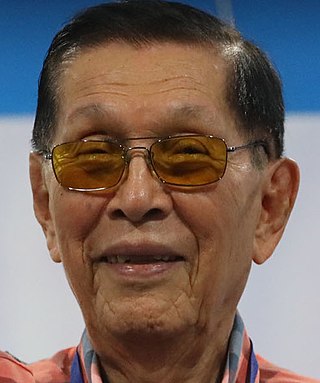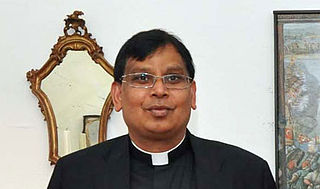
The People Power Revolution, also known as the EDSA Revolution or the February Revolution, were a series of popular demonstrations in the Philippines, mostly in Metro Manila, from February 22 to 25, 1986. There was a sustained campaign of civil resistance against regime violence and electoral fraud. The nonviolent revolution led to the departure of Ferdinand Marcos, the end of his 20-year dictatorship and the restoration of democracy in the Philippines.

Camp General Rafael T. Crame is the national headquarters of the Philippine National Police (PNP) located along Epifanio de los Santos Avenue (EDSA) in Quezon City. It is situated across EDSA from Camp Aguinaldo, the national headquarters of the Armed Forces of the Philippines (AFP). Prior to the establishment of the civilian PNP, Camp Crame was the national headquarters of the Philippine Constabulary, a gendarmerie-type military police force which was the PNP's predecessor.

Camp General Emilio Aguinaldo, also known as Camp Aguinaldo, is the site of the general headquarters (GHQ) of the Armed Forces of the Philippines (AFP).

The 1986 Philippine presidential and vice presidential elections were held on February 7, 1986. Popularly known as the 1986 snap election, it is among the landmark events that led up to the People Power Revolution, the downfall of the presidency of Ferdinand Marcos, and the accession of Corazon C. Aquino as president.

Juan Valentin Furagganan Ponce Enrile Sr.,, also referred to by his initials JPE, is a Filipino politician and lawyer who served as 21st President of the Senate of the Philippines from 2008 to 2013 and known for his role in the administration of Philippine president Ferdinand Marcos; his role in the failed coup that helped hasten the 1986 People Power Revolution and the ouster of Marcos; and his tenure in the Philippine legislature in the years after the revolution. Enrile has served four terms in the Senate, in a total of twenty-two years, he holds the third longest-tenure in the history of the upper chamber. In 2022, at the age of 98, he returned to government office as the Chief Presidential Legal Counsel in the administration of President Bongbong Marcos.

DZFE is a non-commercial radio station owned and operated by Far East Broadcasting Company (Philippines). The station's studio and transmitter are located on the 46th floor of One Corporate Centre, Meralco Ave. cor. Doña Julia Vargas Ave., Ortigas Center, Pasig. This station operates daily from 6:00 AM to 3:00 AM the following day.

The history of the Philippines, from 1965 to 1986, covers the presidency of Ferdinand Marcos. The Marcos era includes the final years of the Third Republic (1965–1972), the Philippines under martial law (1972–1981), and the majority of the Fourth Republic (1981–1986). By the end of the Marcos dictatorial era, the country was experiencing a debt crisis, extreme poverty, and severe underemployment.

DZRV, on-air as Veritas 846 and commonly called as Radyo Veritas, is a radio station owned and operated by the Archdiocese of Manila under the Radio Veritas - Global Broadcasting System. It is the flagship member of the Catholic Media Network. The studio is located at Veritas Tower, 162 West Ave. cor. EDSA, Brgy. Philam, Quezon City, and its transmitter is located at Brgy. Taliptip, Bulakan, Bulacan..
Lawrence John Saldanha is an Indian-born retired Pakistani archbishop. Born in Mangalore, India, he received his religious training at the Christ the King seminary in Karachi and was ordained a priest in Lahore, Pakistan on 16 January 1960.

From 1986 to 1987, there were several plots to overthrow Philippine President Corazon Aquino involving various members of the Armed Forces of the Philippines. A significant number of the military participants in these attempts belonged to the Reform the Armed Forces Movement (RAM), while others were identified loyalists of former President Ferdinand Marcos, who had been deposed in the People Power Revolution in late February 1986.
Good News Catholic TV was established in 2009 and was the first Catholic television broadcast channel in Pakistan. The cable channel and other Christian broadcasts were banned by the government of Pakistan in 2016. Good News Catholic TV continues on via a website with videos.
The Catholic Board of Education is the arm of the Roman Catholic Church in Pakistan responsible for education. Each diocese has its own board. Collectively the Catholic Church runs 534 schools, 8 colleges, and 7 technical institutes in its 2 archdioceses, 4 dioceses, and one Apostolic Prefecture.
The Reform the Armed Forces Movement, also referred to by the acronym RAM, was a cabal of officers of the Armed Forces of the Philippines (AFP) known for several attempts to seize power in the Philippines during the 1980s and 1990s. In 1986, some of these officers launched a failed coup d'état against Ferdinand Marcos, prompting a large number of civilians to attempt to prevent Marcos from wiping the RAM rebels out. This eventually snowballed into the 1986 People Power revolution which ended the dictatorship of Ferdinand Marcos and forced him into exile. RAM later attempted six coups d'état against the administration of Corazon Aquino.

Joseph Arshad is the Catholic Bishop of Islamabad-Rawalpindi in Pakistan.
The People Power Revolution was a series of popular demonstrations in the Philippines that began in 1983 and culminated in 1986. The methods used amounted to a sustained campaign of civil resistance against regime violence and electoral fraud. This case of nonviolent revolution led to the toppling of dictator Ferdinand Marcos and the restoration of the country's democracy.
The military history of the Philippines during the presidency of Ferdinand Marcos, especially the 14-year period between Marcos' proclamation of Martial Law in September 1972 and his eventual ouster through the People Power Revolution of 1986, was characterized by rapid changes linked to Marcos' use of the military as his "martial law implementor".
The February 1986 Reform the Armed Forces Movement coup was set in motion by the Reform the Armed Forces Movement (RAM) under the leadership of Defense Minister Juan Ponce Enrile to depose then-president Ferdinand Marcos, but was discovered and aborted in its earliest stages on February 22, 1986. The coup's intent was to take advantage of the public disruption arising from revelations of cheating during the 1986 Philippine presidential election, and replace Marcos with a military junta which would include Enrile, Philippine Constabulary Chief Fidel V. Ramos, then-Presidential Candidate Corazon Aquino, and Roman Catholic Cardinal Jaime Sin, among others, which Enrile and the RAM Colonels would control from behind the scenes.

In the Philippines during the dictatorship of Ferdinand Marcos, groups and individuals which opposed the regime without subscribing to leftist ideology were usually labeled with the terms "middle force," "third force," the "mainstream opposition," or more rarely, as the "conservative opposition." Mostly consisting of middle class and upper class groups which had been apolitical when Marcos first declared martial law, the most prominent examples of oppositionists in this category include religious groups, business sector groups, professional groups, social democrats, academics, journalists, and artists. Politicians from the traditional opposition are also sometimes counted in this category, although the terms are traditionally associated with ground level opposition, rather than political opposition per se.
On August 28, 1987, a coup d'état against the government of Philippine President Corazon Aquino was staged by members of the Armed Forces of the Philippines (AFP) belonging to the Reform the Armed Forces Movement (RAM) led by Colonel Gregorio Honasan, who had been a former top aide of ousted Defense Secretary Juan Ponce Enrile, one of the instigators of the People Power Revolution that brought Aquino to power in 1986. The coup was repelled by military forces loyal to Aquino within the day, although Honasan managed to escape.
The God Save the Queen Plot was a planned coup in November 1986 by Minister of National Defense Juan Ponce Enrile and the Reform the Armed Forces Movement (RAM), a dissident faction within the Armed Forces of the Philippines (AFP) to overthrow President Corazon Aquino, whom it helped install during the People Power Revolution nine months before. However, the staging of the coup was delayed and ultimately stopped by maneuvers within the AFP led by Chief of Staff General Fidel Ramos before a shot was even fired. As a result, Enrile was subsequently fired by Aquino from her cabinet.










